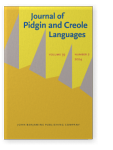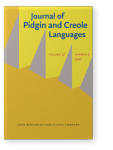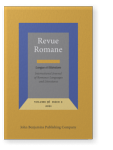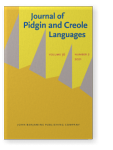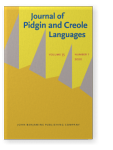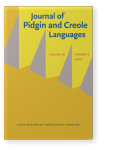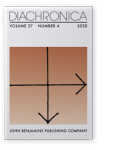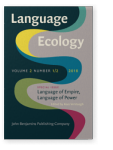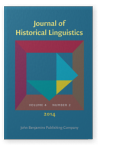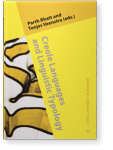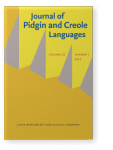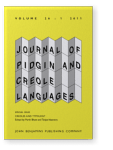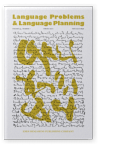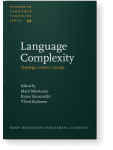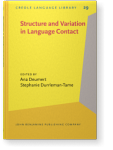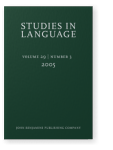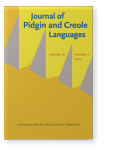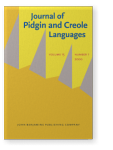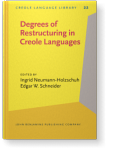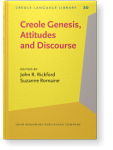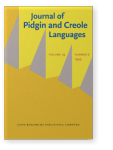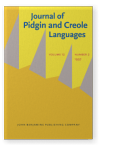Mikael Parkvall
List of John Benjamins publications for which Mikael Parkvall plays a role.
Journal
2024 Skepi Creole Dutch: The Rodschied Papers Journal of Pidgin and Creole Languages 39:2, pp. 394–408 | Article
This paper presents new Skepi Creole Dutch data from the late-18th century, found in the work of the German scholar Ernst Karl Rodschied. The creole data include pronominal and verbal paradigms, a short 60-word excerpt from a private letter, and around two dozen names for local flora. After… read more
2021 How ‘Portuguese’ are Palenquero and Chabacano really? Revue Romane 56:2, pp. 235–266 | Article
A long-lasting debate within creole studies concerns the scarcity of Spanish-based creoles and the theoretical implications this may have. However, there is no agreement as to how many genuinely Spanish-based creoles there are in the world, and identifying the size of that group can generate… read more
2021 Review of Nolan (2020): The Elusive Case of Lingua Franca Journal of Pidgin and Creole Languages 36:2, pp. 438–440 | Review
2020 Chavacano (Philippine Creole Spanish): Are the varieties related? Journal of Pidgin and Creole Languages 35:1, pp. 88–124 | Article
This article argues that the three existing varieties of Chavacano are descendents of one and the same proto-variety. While their direct relatedness used to be agreed upon, it has recently been questioned to differing extents by Lipski (e.g. 1992, 2010, 2013) and Fernández (e.g. 2006, 2011).… read more
2020 Skepi Dutch Creole: The Youd Papers Journal of Pidgin and Creole Languages 35:2, pp. 360–380 | Short note
In this article we present newly found lexical and grammatical data pertaining to Skepi, the Dutch-lexified creole which is now extinct but was once widespread in the Essequibo area of what is today the Republic of Guyana. The source of this new material are the linguistic notes contained in the… read more
2020 Palenquero origins: A tale of more than two languages Diachronica 37:4, pp. 540–576 | Article
Palenquero is a Spanish-lexified creole spoken in Columbia. We argue that existing hypotheses regarding its birth are problematic in several regards. This article addresses the inconsistencies in these hypotheses and provides an alternative, more coherent account. More precisely, we take issue… read more
2018 Français tirailleur : Not just a “language of power” Language of Empire, Language of Power, Versteegh, Kees (ed.), pp. 60–76 | Article
Français-Tirailleur is the conventional name for the French-lexicon pidgin used in France’s African army during the 19th and 20th centuries. Tirailleur literally translates as ‘rifleman’ or ‘sharpshooter’, but in time, and in practice, it came to refer specifically to indigenous colonial… read more
2014 Review of Faraclas (2012): Agency in the Emergence of Creole Languages Journal of Historical Linguistics 4:2, pp. 293–300 | Review
2013 Creoles are typologically distinct from non-creoles Creole Languages and Linguistic Typology, Bhatt, Parth and Tonjes Veenstra (eds.), pp. 9–45 | Article
In creolist circles, there has been a long-standing debate whether creoles differ structurally from non-creole languages and thus would form a special class of languages with specific typological properties. This debate about the typological status of creole languages has severely suffered from a… read more
2011 Creoles are typologically distinct from non-creoles Creoles and Typology, Bhatt, Parth and Tonjes Veenstra (eds.), pp. 5–42 | Article
In creolist circles, there has been a a long-standing debate whether creoles differ structurally from non-creole languages and thus would form a special class of languages with specific typological properties. This debate about the typological status of creole languages has severely suffered from… read more
2010 How European is Esperanto? A typological study* Language Problems and Language Planning 34:1, pp. 63–79 | Article
The typological similarities between Esperanto and other languages have long been a matter of debate. Assuming that foreign-language structures are more easily acquired when they resemble those of the learner’s native tongue, any candidate for a global lingua franca obviously ought to be as… read more
2008 The simplicity of creoles in a cross-linguistic perspective Language Complexity: Typology, contact, change, Miestamo, Matti, Kaius Sinnemäki and Fred Karlsson (eds.), pp. 265–285 | Article
This paper discusses the possibility of quantifying complexity in languages in general, and in creoles in particular. It argues that creoles are indeed different from non-creoles, primarily in being less complex. While this has been argued before, this is the first attempt to prove it through the… read more
2006 Was Haitian ever more like French? Structure and Variation in Language Contact, Deumert, Ana and Stephanie Durrleman (eds.), pp. 315–335 | Chapter
In the debate on whether or not plantation creoles started out their lives as pidgins, attention has focused on the amount of structure inherited from the lexifier language. Many who argue for a mother-daughter relationship between lexifiers and creoles assume that these similarities derive from… read more
2001 Creolistics and the quest for creoleness: A reply to Claire Lefebvre Journal of Pidgin and Creole Languages 16:1, pp. 147–151 | Miscellaneous
2000 Reassessing the role of demographics in language restructuring Degrees of Restructuring in Creole Languages, Neumann-Holzschuh, Ingrid and Edgar W. Schneider (eds.), pp. 185–214 | Article
1999 On the Possibility of Afrogenesis in the Case of French Creoles Creole Genesis, Attitudes and Discourse: Studies celebrating Charlene J. Sato, Rickford, John R. and Suzanne Romaine (eds.), pp. 187–214 | Article
1999 The Creolist Archives Journal of Pidgin and Creole Languages 14:2, pp. 347–350 | Miscellaneous
1997 Review of Eriksen (1994): Kulturelle veikryss. Essays om kreolisering Journal of Pidgin and Creole Languages 12:2, pp. 356–358 | Review
“Mij dodte, mij loppe, in mijn lande”: Extending the horizon on documented contact language use in the Virgin Islands with a quote in incipient Dutch Creole from 1681 Journal of Pidgin and Creole Languages: Online-First Articles | Article
A 1681 letter written by Jørgen Iversen (1638–1682), the first governor of Danish St. Thomas, unearthed from the Danish National Archives, contains a quote in incipient Virgin Islands Dutch Creole (VIDC). The quote, Mij dodte, mij loppe, in mijn lande, lit. ‘I die/dead, I go, in my country’… read more
